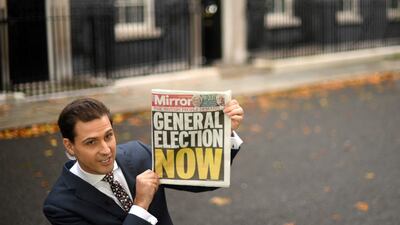Calls for a UK general election are growing with some politicians claiming the current crisis in Westminster can only be resolved by a fresh vote by the British public.
Leaders of the main opposition parties have called for an election, including Labour, the Liberal Democrats and the SNP, and much of the electorate is believed to back such a move.
Despite the clamour, a new vote may not yet be on the horizon as an election can be called only in certain scenarios.
Here are the permutations for how a new government could be formed:
Parliament elapses
The UK's next election is due to be on Thursday May 2, 2024, under the Fixed Term Parliament Act 2011, which holds that an election must be held at least once every five years.
The Tory party enjoys a sizeable 71-seat majority in the House of Commons and any new election is expected to reverse this situation. The Conservatives are therefore likely to resist early election calls unless absolutely necessary.
Facing a grim set of polling numbers, Conservative Party MPs will be hoping they can ride out the remaining parliamentary term and recover some credibility after the disastrous leadership of Liz Truss.
Labour’s poll average as of Friday was 54 per cent, with the Conservatives on 21 per cent, the Liberal Democrats on 10 per cent and the Greens on 4 per cent.
PM calls early election
The sitting prime minister has the power to call an early election to restore its mandate, as Theresa May attempted in 2017 but which resulted in her party losing its parliamentary majority.
The power to call a snap election was reinstated by the Dissolution and Calling of Parliament Act 2022.
But the potential return of Boris Johnson as prime minister is likely to signal the return of infighting which has plagued the party the since the Brexit vote in 2016.
If successful, other candidates, including Rishi Sunak and Penny Mordaunt, would also have to deal with troublesome party rebels who may vote down crucial legislation and make the new prime minister's position untenable.
Under those circumstances, the prime minister would then request that King Charles III dissolve parliament. Once an election is called, polling day would likely take place 25 days later.
King dissolves parliament
Under the British constitution, the monarch still has the power to dissolve parliament, even against the advice of his own prime minister, a power that was last used more than a century ago.
King Charles acceded the throne last month and has been much more forthright than his predecessor and may be tempted to act if Britain is dragged further into a crisis.
Such a move remains highly unlikely but is technically a possibility.
Adam Tomkins, a constitutional expert at the University of Glasgow, said the monarchy's power to dissolve parliament or to dismiss the government is there "just in case".
He wrote: "Not for the first time this year I find myself wondering again about the monarch’s reserve powers. I’m not saying these powers should be used (yet); still less that they will be. But they are there, just in case …
"Think of them as safety valves, buried deep in the Constitution, for emergency use only, such as when government is collapsing and what might be called the usual channels (men in grey suits) don’t seem able to fix it."


